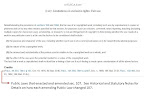
To use many legislative history sources, you need to know the Public Law Number.
To find the Public Law (P.L.) number:

6. Conference Report
H.Rpt, H.Conf.Rpt=House Conference Report (may be same as for House Report)
S.Rpt=Senate Conference Report (same as for Senate Report)
example: H.Rpt 111-89
7. Presidential Signing Statement
WCPD=Weekly Compilation of Presidential Documents
DCPD=Daily Compilation of Presidential Documents
See Bluebook Rule 13 for citing rules.
Good sources for legislative history research include:
1. ProQuest Congressional (access restricted)
2. Thomas
3. HeinOnline Federal Legislative History Library (access restricted)
See boxes below for detail on each of these.
For date coverage for hearings and reports, see Basic full-text coverage summary box on left
ProQuest Congressional (access restricted) is the most robust database for legislative history research, but it costs big $$$. If you do have access, find the Public Law number for the statute you are interested in (see box at left) and use the Search By Number link as pictured below. You will get a complete list of documents (listed in the Executive Summary at lower left), many with links to the full text.
Basic full-text Coverage summary:
Access to ProQuest Congressional requires a subscription. (Links will work for Hofstra Law Community only)
On the next screen click on the "Legislative History" link on the right.
Thomas is free - which means it is not as comprehensive as subscription databases but can be very useful for basic legislative history research. Again, having the Public Law number (see box at left) is very useful. Thomas will give you links to versions of bills as well as the Congressional Record and Committee Reports.
Thomas homepage
Finding an Act with the Public Law number (example 111-147)
Viewing the Public Law listing
HeinOnline Federal Legislative History Library (access restricted) compiles the various legislative history documents for specific laws and provides full text access to those documents. The advantage of using HeinOnline is that you can do full-text searches across the different documents for key phrases. The disadvantage is that HeinOnline does not include every Act passed by Congress. Again, having the Public Law number is helpful, although you can also find you Act by Popular Name.
Access to HeinOnline requires a subscription. (Links will work for Hofstra Law Community only)